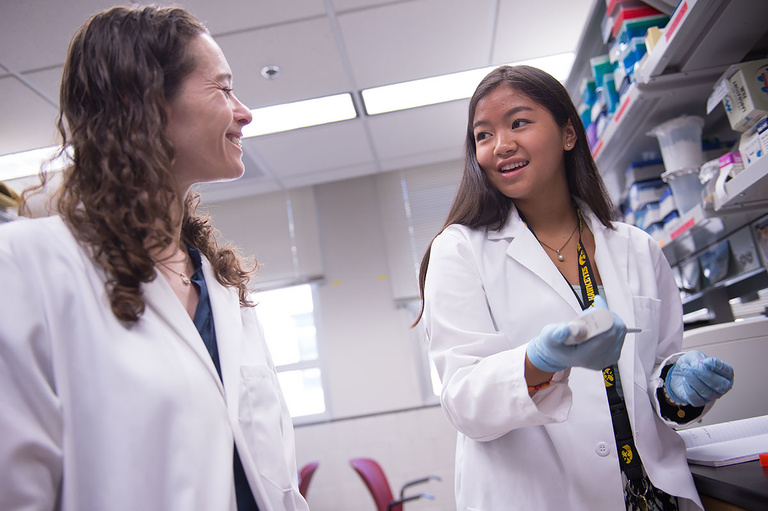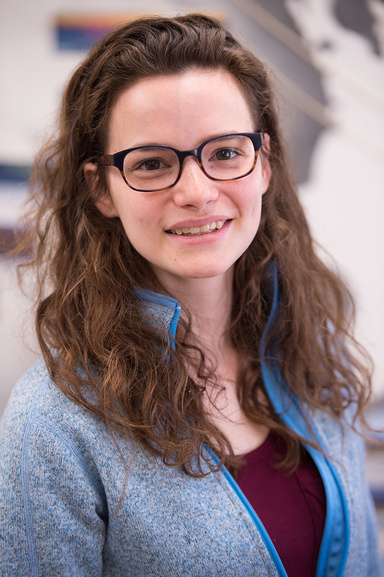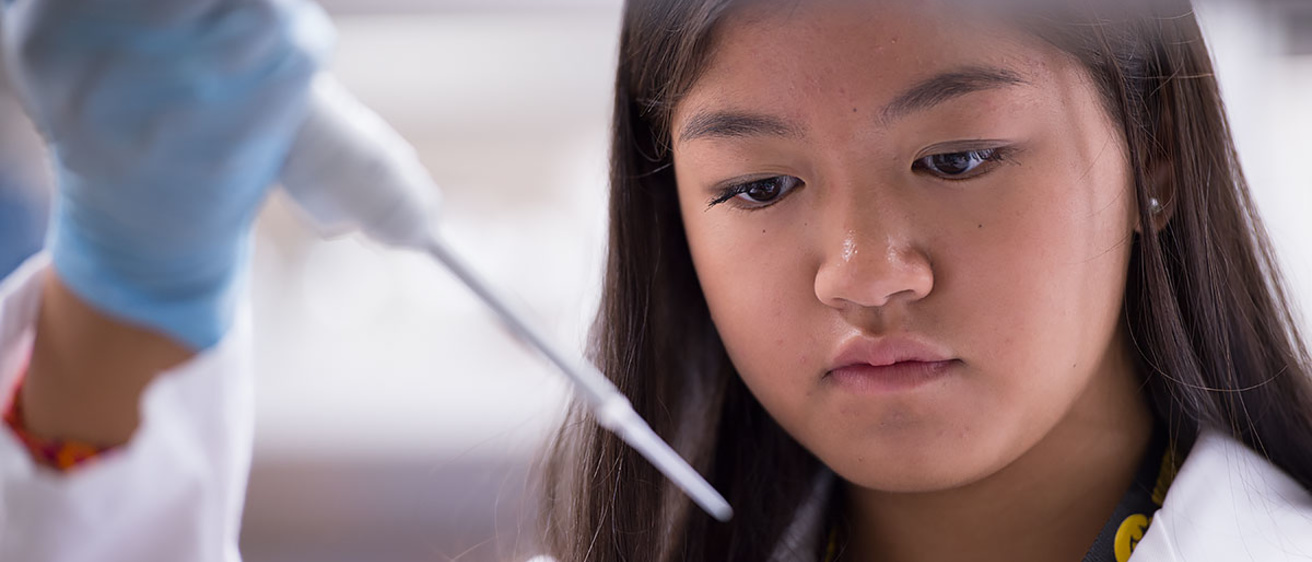Alexandra Chan of Woodbury, New York, so enjoyed conducting research on the University of Iowa campus last summer that once was not enough.
Bitten by the research bug, the 16-year-old soon-to-be high school senior is now back for the second year in a row. This time, she’s in UI Biology Associate Professor Maureen Neiman’s lab, conducting hands-on research as part of a National Science Foundation-funded sequencing project using a freshwater snail native to New Zealand.

What drew Chan to Iowa is a rigorous summer residential research program, the Secondary Student Training Program (SSTP), operated by the UI College of Education's Belin-Blank International Center for Gifted Education and Talent Development.
Chan is just one of nearly 40 students from as far away as Turkey and China and as close as Iowa City who participated in SSTP this summer.
The students are pursuing research in disciplines as diverse as chemistry and computer science to pharmacy and psychology, involving four different colleges—the Carver College of Medicine and the Colleges of Liberal Arts and Sciences, Engineering, and Pharmacy.
While in Neiman’s lab, Chan is engaged in research related to exploring how sexual reproduction influences genome evolution.
“Being able to independently work is a big achievement for me,” Chan says, “because I didn’t have any knowledge of the procedures, technology, or materials when I first got here.”
Secondary Student Training Program poster session and open house
10 a.m.-noon
Friday, July 24
Second-floor reception area of University Capitol Centre, above the food court
The event is free and open to the public. For more information or special accommodations: 319-335-6196.
Faculty or students who are interested in participating in the SSTP can contact Lori Ihrig at 319-335-2393.
She adds that people like Neiman and UI biology doctoral student and mentor Kyle McElroy have made the experience rewarding.
“It is truly rare for a high school student to be welcomed into a top-notch research institution, surrounded by busy, brilliant, and hard-working faculty and graduate students, and be able to feel as if she’s an important part of the team,” Chan says. “I am lucky enough to always feel like I have a significant role in my project and in the lab because of the great people who work here.”
Chan found out about the program from her mom, Marilyn Wong, who attended the program almost 30 years ago and is now a medical doctor specializing in radiology.
Wong had such a positive experience, that she encouraged her daughter to pursue it as well, noting the profound impact it had on her own life and career.
“She still talks fondly of the amazing friends she made here and all of the opportunities the program has given her,” Chan says.
Sense of community, family
The program, which originated in the 1950s, has turned out thousands of alumni over the past 60 years. Some students go on to pursue degrees at major research institutions, including the UI, while others attend Ivy League institutions or private colleges.
But no matter where they go, participants agree the program had a profound impact on influencing their future careers.
Some of the students become so fond of the UI campus, they choose to return here as college students.
Claire Tucci of Long Island, New York, participated in the program in summer of 2009 and applied to the UI shortly thereafter.

Tucci says she learned about the program through a research course she took at Calhoun High School in Merrick, New York. Iowa was not even on her radar before then.
“In fact, I had to look it up on a map,” says Tucci, “but after coming to SSTP, the University of Iowa felt like home.” Tucci received her Bachelor of Science in cell and developmental biology from the UI and is now pursuing a master’s degree in biology, co-advised by Neiman and Douglas Houston, associate professor of biology.
Neiman says this is not an uncommon experience. She has mentored more than 10 SSTP students over the past seven years, with Tucci being her first SSTP student. Not only do the students become integral parts of the research team, they become part of a community that feels like a family, she adds.
“I will be attending Claire’s wedding next summer, and former SSTP students have been there for me when my mom passed away last year,” Neiman says. “It’s an incredible support system.”
Neiman adds that past and current SSTP students such as Tucci and Chan make tangible contributions to the cutting-edge research she and others are pursuing.
“I integrate concepts and methods from across biology to ask why nearly all living organisms rely on sexual reproduction to produce offspring, a central unresolved evolutionary question,” Neiman says. “Alex is helping us answer this question by generating data that will enable us to evaluate a promising but largely untested hypothesis for the maintenance of sex, that sexual reproduction persists because it enables sexually reproducing organisms to cleanse their genome of parasites.”
Highly selective program
Lori Ihrig, the SSTP lead administrator and Belin-Blank Center supervisor for curriculum and instruction, says that though there are other summer research opportunities, SSTP is recognized nationally as being a rigorous and competitive program.
The seven Iowa students involved in the program:
Harrison Qu, Bettendorf, Iowa
Emily Suen, Bettendorf, Iowa
Sarah Gao, Cedar Falls, Iowa
Sruthi Palaniappan, Cedar Rapids, Iowa
Liza Casella, Iowa City, Iowa
Max Otoadese, Iowa City, Iowa
Sara Cabeen, New Market, Iowa
“What sets SSTP apart from some other summer research experiences for high school students is that it is a highly selective program that draws high-ability students from Iowa and across the world to work with the UI's world-class faculty,” Ihrig says.
Of the more than 167 students who applied this year, only 39 were selected. To apply, each student submitted two letters of recommendation, their transcript, standardized test scores, and two essays.
Ihrig explains that after selecting students based on these criteria, staff begins trying to find placements that would be a good match, based on research interests, previous research experience, and high school coursework. When all of the pieces fall into place with the applications, they are able to offer those students a match in a research lab for the summer.
SSTP students earn three semester hours of college credit, and financial aid is available for those who qualify.
In addition to getting college credit under their belts, students get the opportunity to experience life out of the classroom. This year, they attended the Iowa City Jazz Festival, participated in fencing and martial arts, and have taken trips to Maquoketa Caves and the Mississippi River Museum.
"It’s the memories of what happens both inside and out of the research programs that will stick with the students after they leave campus," Ihrig says.
And though Chan is undecided about her future goals, she does know one thing for sure—she definitely wants to continue pursuing research in college.
“My passion has always been in biology, and I am interested in medical school. My past two summers, working in a lab with real researchers and students alike, have helped influence my decision to continue research in college,” Chan says. “I think it is so important to always be challenged and force yourself to question current beliefs. I believe scientific inquiry, especially during my college years, will provide me with an innovative and unique perspective on whatever I decide to study.”
